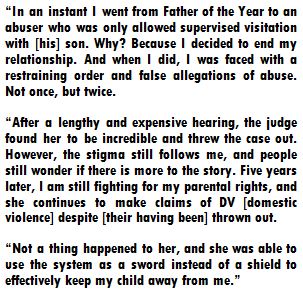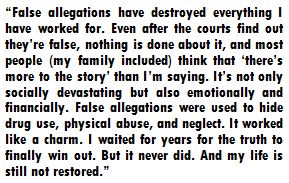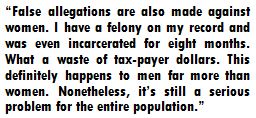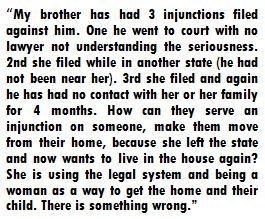I’ve earnestly and objectively examined posited rates of false allegations in recent months, because statistics and analytics are what we soonest regard as estimates of the truth. It’s typical of writers hostile to the notion that false allegations are rampant, as well as of legal analysts and social scientists, to cite such rates, particularly official approximations of the incidence of false claims of rape and domestic violence.
 What even very balanced and cogent analyses of these rates fail to observe, however, is that not all false allegations are of crimes and not all false allegations of crimes are criminally alleged, that is, false allegations of crimes may very conveniently be made through the civil court on restraining/protection order applications (as may be false allegations of every other kind). The number of criminal claims rejected or discredited by the police, then, is not an accurate measure or reflection of the prevalence, nature, or magnitude of false allegations.
What even very balanced and cogent analyses of these rates fail to observe, however, is that not all false allegations are of crimes and not all false allegations of crimes are criminally alleged, that is, false allegations of crimes may very conveniently be made through the civil court on restraining/protection order applications (as may be false allegations of every other kind). The number of criminal claims rejected or discredited by the police, then, is not an accurate measure or reflection of the prevalence, nature, or magnitude of false allegations.
It doesn’t, in fact, scratch the surface.
Allegations made pursuant to the procurement of a civil restraining order are never dismissed by the police (and plaintiffs may bypass the police entirely). Unless a complainant seeks to have someone criminally charged, the police have nothing to do with it. Their role is simply that of usher. They steer the complainant toward the courthouse. And if a restraining/protection order is obtained (or possibly just alleged to have been obtained) by a complainant, police inclination is to credit his or her allegations on reflex, because they’ve been conditioned to accept restraining order applicants’ claims at face value, that is, as legitimate.
 Because the truth or falsity of allegations is irrelevant in civil proceedings, there are no comprehensive statistics relating to false allegations made on restraining orders. The awarding of restraining orders is grounded on the forcefulness of plaintiffs’ allegations and judicial discretion. It might be possible to determine how many restraining order applications nationwide were rejected in a given period; it’s impossible, however, to determine how many were rejected because judges determined their allegations to be false (rather than just insufficient), or how many were approved in spite of false allegations.
Because the truth or falsity of allegations is irrelevant in civil proceedings, there are no comprehensive statistics relating to false allegations made on restraining orders. The awarding of restraining orders is grounded on the forcefulness of plaintiffs’ allegations and judicial discretion. It might be possible to determine how many restraining order applications nationwide were rejected in a given period; it’s impossible, however, to determine how many were rejected because judges determined their allegations to be false (rather than just insufficient), or how many were approved in spite of false allegations.
There is no accurate assessment of the volume or degree of lying in civil court. Significantly, too, false allegations made in civil court may easily evolve into criminal allegations that stick, despite those criminal allegations’ original premises’ having been trumped-up.
Journalists who address the subject of false allegations, typically focusing on rape, are prone to dismiss the charge that false allegations are commonplace based on how few plaintiffs are prosecuted for bringing fraudulent allegations. The false assumption of these investigators is that fraudulent allegations are necessarily prosecuted when detected. The fact is that even false allegations of rape may only rarely be prosecuted (see, for example, this case, in which allegations were determined to be unfounded and cost their plaintiff $55,000 but weren’t deemed grounds for the plaintiff’s being prosecuted for perjury). False allegations of sorts other than rape may never be acknowledged as false by judges, let alone deemed grounds for prosecution by district attorneys’ offices (which couldn’t care less). So the equation prosecutions for false allegations are rare = false allegations are rare is flatly wrong.
 Isolated, regional studies have been performed by governmental agencies, including one in West Virginia that famously concluded that four out of five (domestic violence) restraining orders were either “unnecessary” or fraudulently based. Since an estimated two to three million restraining orders are issued each year in the United States alone, however, even national scrutiny of every restraining order issued in a given week for false allegations would be impracticable.
Isolated, regional studies have been performed by governmental agencies, including one in West Virginia that famously concluded that four out of five (domestic violence) restraining orders were either “unnecessary” or fraudulently based. Since an estimated two to three million restraining orders are issued each year in the United States alone, however, even national scrutiny of every restraining order issued in a given week for false allegations would be impracticable.
Restraining order rulings—disregarding how they’re perceived by the accused and how others perceive the accused because of them—aren’t determinations of guilt or innocence, as criminal rulings are. Restraining order rulings are at best kinda-sorta judgments based on plaintiffs’ persuasiveness.
Even that’s overly dignifying a process that’s initiated on the basis of a brief, one-sided interview of five or 10 minutes that results in the issuance of an order of the court that its defendant may be granted only a half-hour hearing to challenge (and only half of that 30 minutes is afforded to the defendant’s presentation). The idea that restraining order rulings are the products of scrupulous deliberation is beyond absurd.
 To repeat, there is no accurate assessment of the volume or degree of lying in civil court. And it’s worthy of repeated observation, moreover, that when false allegations succeed in restraining order adjudications, defendant susceptibility to false criminal allegations increases exorbitantly, so prejudicially is the procurement of a restraining order regarded. How handily restraining orders are obtained and how carelessly their merits are ruled upon are conveniently disregarded after the fact. The next judge down the line is authorized to assume that the original allegations validated by the previous judge were in effect “true.”
To repeat, there is no accurate assessment of the volume or degree of lying in civil court. And it’s worthy of repeated observation, moreover, that when false allegations succeed in restraining order adjudications, defendant susceptibility to false criminal allegations increases exorbitantly, so prejudicially is the procurement of a restraining order regarded. How handily restraining orders are obtained and how carelessly their merits are ruled upon are conveniently disregarded after the fact. The next judge down the line is authorized to assume that the original allegations validated by the previous judge were in effect “true.”
The system is rigged both to guillotine the falsely accused and to ensure that false allegations are never discerned or acknowledged as such. The conception is marvelously diabolical, and its effectiveness is witnessed by the fact that the restraining order process has hummed along without a hitch for decades in spite of its being outrageously slack and tendentious (even while levying monstrous sanctions).
Where honest parties with an interest in social justice should seek an estimate of the volume, degree, and consequence of lying is in the testimonies of defendants and the lawyers who (sometimes) represent them—who, in the latter case, if they’re honest (and many are), will readily own that exploitive and malicious use of restraining orders is unexceptional, particularly in family court.
That statistics themselves lie shouldn’t be a novel proposition to anyone. The truly desolating fact to everyone who’s been lied about is that purveyors of statistics of false allegations may not have the least idea that their denial of the rampancy of lying invalidates the trials and torments of multitudes of victims.
Copyright © 2014 RestrainingOrderAbuse.com
Reblogged this on Protective Order Victims (POV).
LikeLike
Restraining Order Abuse is exactly what has happened to me. It’s been a year and a half now since my husband served me with an RO. I still have not seen a judge. My husband asked for a two-day trial, which was constantly continued. I fired my attorney, whom I had retained a month before my husband served me. She was supposed to be an advocate for abused women. She wanted me to take out an RO on my husband, because I called the police for the first time in 23 years when my husband roughed me over asking for the taxes. The only problem was the cops in my area are longtime friends of my husband and took his story over mine, even though I had bruises on my arms. At that point, I was in total fear of my husband. I told my attorney where would he go? I didn’t have it in my heart to put anyone in the street and asked her to give me a few weeks to think about it. Well, look where I am now. I had no idea of the power of an RO. I found out all she did was take advantage of my fearful state and play with me like a cat with a mouse. She told me I was lucky to get $600 a week. She was rubbing backs with my husband’s attorney. Thank god I started educating myself with this site and fired her. It took me three months to raise $5,000 for a new attorney outside our area. I lucked out with finding an attorney in LA who deals with this kind of situation. The new attorney let me sign liens on my home and business buildings, and hire a CPA. My old attorney told me I had no rights. My children even had to leave the home because of all the wild parties and women in our family home. That statement should tell you what kind of man my husband is—a narcissistic sociopath who has no concern or empathy for his family of 24 years. The RO has allowed my husband to take no responsibility for his marriage and children. Also to hide assets and spend lots of money (half mine) on vacations and women. The three of us are trying to survive in a RV in a dirt lot. I know now that my husband served me with an RO because he found out I retained an attorney. He knew if we divorced, our business books would be looked at. He is very fraudulent with the business. The RO has cut me off from everything. He closed accounts, credit cards, my phone, gas cards, medical, eye and dental, registration on my truck, and registration on the RV (I’m not even allowed to drive or move the RV). He agreed to give me $600 a week at this point. He is still abusing me by controlling my life. Sometimes I have such a hard time believing something like this could happen in the USA. Everything I worked for in the last 23 years of marriage has just been totally taken away. EVERYTHING, even baby pictures. I feel like I was hit by a tornado and ended up in the street, and no one even noticed. Today my new attorney has hired a CPA and demanded my husband turn over all records from our corporation. At this point, the RO has cost me $45,000, and I just signed $75,000 in liens towards the CPA and divorce attorney. Wait till my husband finds out I signed the liens. I really fear for my life. With the RO on me, I’m not allowed to have anything in my possession that’s considered a weapon. I’m a sitting duck in this RV. He controls where it’s parked. So I got a big dog. This has been a nightmare for me and my children. My husband, with a few pieces of paper of lies that a judge signed, has taken my whole life away. It’s been a nightmare. It’s hard enough to go through a divorce. This RO abuse is enough to drive someone to suicide. I have thought of it myself in feeling there was no hope, being almost homeless. My beautiful children keep me going, thank god. I wonder if there is a suicide rate in this situation. So grateful to have this site to vent. I could write an RO nightmare novel. Maybe when this is over with. I might need the money. I should be able to sue the judge also for allowing this horrible injustice to happen without evidence of guilt. Shame on him.
EXHAUSTED.
Rhonda
LikeLike
It’s good to hear you’re managing to reclaim your power, Rhonda. I’ve never been someone who was particularly socially invested, so when I hear about this stuff, all I can think is that there are people in the world (a broad swath of the population, in fact) who don’t have access to toilets—to toilets—and every species but ours is still scrabbling in the dirt for sustenance. How self-important and -indulgent are we that we have systems that allow this kind of unnecessary (life-hijacking) drama and trauma to occur? Just imagining the paperwork makes me nauseated. This is supposed to mean we’re civilized? It’s authorized cannibalism, the stuff of Greek myth: people eating their own children. But only, of course, “figuratively.” It’s all bloodless, so we can congratulate ourselves for being “socially progressive.” It’s funny. My own case involved people who style themselves healers, third-world activists, and protectors of the public good. All of these lofty “missions” are blown off and betrayed when there’s an opportunity to exact some petty schoolyard vengeance. Just a restraining order (never mind all the legal shenanigans that issue from it) is estimated to cost the state somewhere between $1,000 and $2,000. Imagine what money like that could have done for the starving kid in India who just died for want of it. But for the drama and trauma, though, judges and lawyers wouldn’t be able to afford country club memberships. So you and your children have to reside in an RV, live on beans, and depend on a dog for a measure of security. And all of your tribulations stem from a process that was conceived to look out for the interests and welfare of women and children. Because here in the good ol’ US of A, we’re vigorously opposed to punishing victims. You could probably get a free poster paid for by the Violence Against Women Act to hang on the wall of your motor home that says so.
You guys hang in there and stay safe. I don’t get the chance to say this very often, but it sounds like you’re in capable hands.
LikeLike
Mark Banschick, M.D., writing for Psychology Today:
LikeLike